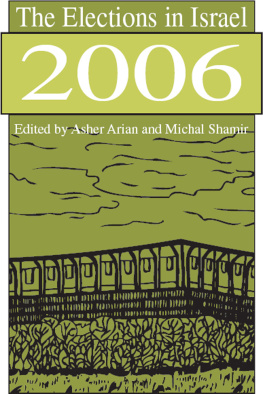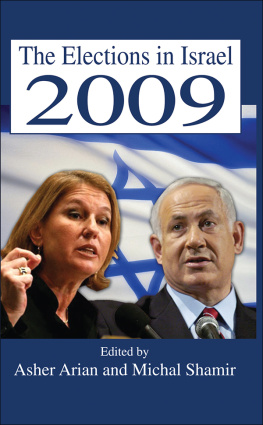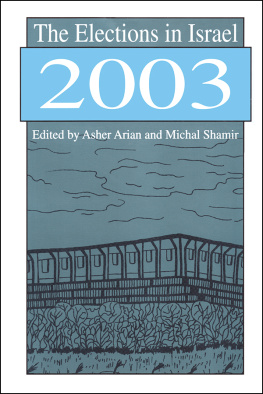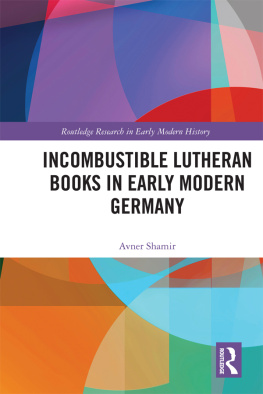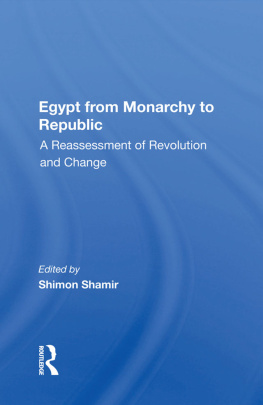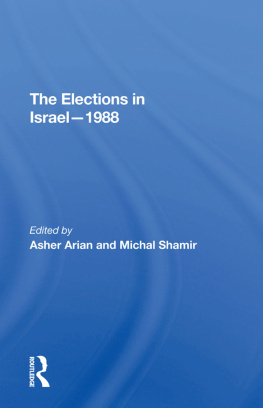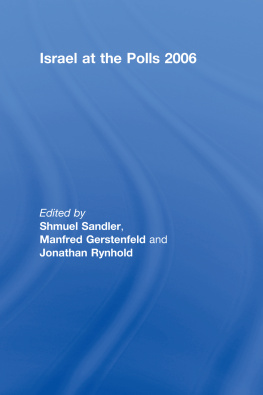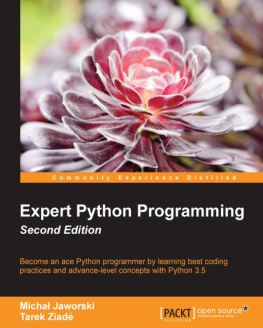The Elections in Israel
2006
Published in cooperation with the Israel Democracy Institute.
The Israel Democracy Institute is an independent, non-partisan body on the seam of academia and politics. The Institute plans policy and devises reforms for government and public administration agencies, and for the institutions of democracy.
In its plans and endeavors, the Institute strives to support the institutions of Israels developing democracy and consolidate its values. The Institutes serious research work is followed up by practical recommendations, seeking to improve governance in Israel and foster a long-term vision for a stable democratic regime adapted to the structure, the values, and the norms of Israeli society. The Institute aspires to further public discourse in Israel on the issues placed on the national agenda, to promote structural, political, and economic reforms, to serve as a consulting body to decision-makers and the broad public, to provide information and present comparative research.
Researchers at the Israel Democracy Institute are leading academics directing projects in various areas of society and governance in Israel. The Institutes publications department produces, markets, and distributes the results of their work in several series of books (The Democracy Library), policy studies, the Caesarea Forum, periodicals, and conferences proceedings.
TranslatorDorothea Shefer-Vanson
Language Editor (English)Rachel Wind Wiesen
Language Editor (Hebrew)Iris Avner
The Elections in Israel
2006
Edited by Asher Arian and Michal Shamir
First published 2008 by Transaction Publishers
Published 2017 by Routledge
2 Park Square, Milton Park, Abingdon, Oxon OX14 4RN
711 Third Avenue, New York, NY 10017, USA
Routledge is an imprint of the Taylor & Francis Group, an informa business
Copyright 2008 by Taylor & Francis.
All rights reserved. No part of this book may be reprinted or reproduced or utilised in any form or by any electronic, mechanical, or other means, now known or hereafter invented, including photocopying and recording, or in any information storage or retrieval system, without permission in writing from the publishers.
Notice:
Product or corporate names may be trademarks or registered trademarks, and are used only for identification and explanation without intent to infringe.
Library of Congress Catalog Number: 2007039347
Library of Congress Cataloging-in-Publication Data
The elections in Israel, 2006 / Asher Arian and Michal Shamir, editors.
p. cm.
Published in cooperation with the Israel Democracy Institute.
Includes bibliographical references and index.
ISBN 978-0-7658-0388-7 (alk. paper)
1. ElectionsIsraelHistory. 2. Israel. KnessetElections, 2006. 3. IsraelPolitics and government21st century. I. Arian, Asher. II. Shamir, Michal, 1951- III. The Israel Democracy Institute.
JQ1830.A95E435 2008
324.95694054dc22
2007039347
ISBN 13: 978-0-7658-0388-7 (hbk)
Contents
Asher Arian and Michal Shamir
Michal Shamir, Raphael Ventura, Asher Arian, and Orit Kedar
Paul R. Abramson, John H. Aldrich, Andr Blais, Daniel Lee, and Renan Levine
Shas Transformation to Likud with Kippa?
A Comparative Assessment of the Moderation of Religious Parties
Sultan Tepe and Roni Baum
Viacheslav Konstantinov
Michael Philippov
Elie Rekhess
Gideon Rahat
Jonathan Mendilow
Doron Navot
Media Coverage of the 2006 Campaign: The Needs and
Attitudes of the Public vis--vis the Functioning of the News Media
Gabriel Weimann, Yariv Tsfati, and Tamir Sheafer
Nir Atmor
Our sincere thanks to Edna Granit, Anat Bernstein, and Nadav Shtechman for their generous help in the production process, to Dorothea Shefer-Vanson for her translation, to Rachel Wind Wiesen for her editorial work, to Amnon Lahad, who provided the drawing of the Knesset building at the age of 11 in 1971, to Daphne Kanellopoulos for her work in producing the English version, to Adi Livny for constructing the index, to the scholars who agreed to review anonymously the articles submitted to this volume, and to Tel Aviv Universitys Alvin Z. Rubinstein Chair of Political Science for its financial support.
A. A.
M. S.
Asher Arian and Michal Shamir
Several dramatic events preceded the elections to the Seventeenth Knesset on March 28, 2006, beginning with the unilateral withdrawal from Gaza in August 2005 and its attendant and unprecedented removal of Jewish settlements and settlers, followed by major shifts among and within the various political parties. Most dramatic was the split in Likud when Prime Minister Ariel Sharon decided to form a new party, Kadima, leading to the breakup of the Likud party that Sharon had formed in 1973. Both Labor and Likud found themselves with new leadersAmir Peretz and Binyamin Netanyahuand with depleted ranks. Shinui, a party that had soared in 2003 under the leadership of Tommy Lapid, but whose second-tier activists soured on the leadership and ruptured it three years later, imploded before the elections. And Sharon, prime minister since 2001, succumbed to a stroke soon after he had formed Kadima and arranged for elections to be held at the end of March 2006. He was succeeded by his deputy prime minister, Ehud Olmert.
However, despite the preponderance of dramatic events, the Israeli electorate was not enthusiastic, and voted at the lowest rate ever in Knesset elections. There were indications that this would occur from polls taken prior to the elections, yet its actual occurrence firmly established that Israel joined the trend of declining electoral participation evidenced in other industrialized democracies.
The elections resulted in a clear winner, Kadima (see table 1). It obtained less votes than expected based on pre-election polls, but still outdistanced the other parties with its 29 seats in the Knesset, followed by Labor, its closest competitor with only 19 members of Knesset (MKs). Olmert formed a coalition government supported by 67 members of the 120-person Knesset with Labor (19), Shas (12), and the new Pensioners party (7), and presented it to the Knesset on May 4, 2006. With no party achieving a decisive majority, the overall fragmentation of the Knesset increased; it reached levels of party volatility not witnessed since the 1977 realignment. The legal threshold for representation in the Knesset elections was raised from 1.5 to 2 percent of the valid votes before these elections, and the smallest party to win representation was Balad with 2.3 percent of the vote. In all, 12 parties are represented in the Seventeenth Knesset.
Table 1
Results of the 2006 Knesset Electionsa
Valid Votes | % of Valid Votes | No. of Knesset Seats |
Kadima | 690,901 | 22.0 | |
Labor-Meimad | 472,366 | 15.1 | |
Shas | 299,054 | 9.5 | |
Likud | 281,996 | 9.0 | |
Israel Beiteinu | 281,880 | 9.0 | |
National Unity-Mafdal |


